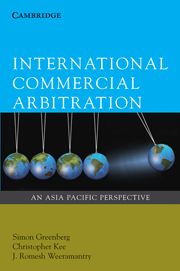Book contents
- Frontmatter
- Contents
- Foreword
- Preface
- Table of Cases
- Table of Statutes
- 1 Introduction to international arbitration and its place in the Asia-Pacific
- 2 Law governing the arbitration and role of the seat
- 3 Applicable substantive law
- 4 Arbitration agreement
- 5 Arbitral jurisdiction
- 6 The arbitral tribunal
- 7 Procedure and evidence
- 8 The award
- 9 The award
- 10 Investment treaty arbitration
- Appendix 1 Asia-Pacific arbitral institutions at a glance
- Appendix 2 Selected arbitral institutions
- Appendix 3 List of UNCITRAL Model Law countries
- Appendix 4 List of parties to the New York Convention 1958
- Appendix 5 Selected list of Asia-Pacific arbitration legislation and instruments
- Glossary
- Index
7 - Procedure and evidence
Published online by Cambridge University Press: 05 June 2012
- Frontmatter
- Contents
- Foreword
- Preface
- Table of Cases
- Table of Statutes
- 1 Introduction to international arbitration and its place in the Asia-Pacific
- 2 Law governing the arbitration and role of the seat
- 3 Applicable substantive law
- 4 Arbitration agreement
- 5 Arbitral jurisdiction
- 6 The arbitral tribunal
- 7 Procedure and evidence
- 8 The award
- 9 The award
- 10 Investment treaty arbitration
- Appendix 1 Asia-Pacific arbitral institutions at a glance
- Appendix 2 Selected arbitral institutions
- Appendix 3 List of UNCITRAL Model Law countries
- Appendix 4 List of parties to the New York Convention 1958
- Appendix 5 Selected list of Asia-Pacific arbitration legislation and instruments
- Glossary
- Index
Summary
Introduction
This chapter concerns the procedure governing the conduct of an arbitration. Its temporal scope commences from the claimant's initiation of the arbitration and extends up to the closure of the arbitral proceedings.
Parties opting for international commercial arbitration are given considerable freedom to choose and individually tailor the procedure of the arbitration. Arbitral procedure may be conducted in flexible, cost-efficient and innovative ways that are attractive to the business community. Through this free choice of the parties, arbitral procedure has evolved to be significantly distinct from the rigid procedures traditionally adopted by courts. In a study on the views of in-house counsel at leading multinational corporations published in 2006, flexibility of procedure emerged as the most widely recognised advantage of international commercial arbitration. Another relevant finding in that study was that ‘active participation of the parties in determining and shaping the procedure inspires confidence in the process’.
Section 2 of this chapter explores the important role of party autonomy in arbitral procedure. Rules, procedural law and guidelines are discussed in Section 3. Section 4 focuses particularly on core arbitral procedural rights and duties. Section 5 deals with the way international arbitration balances traditional differences between the common and civil law systems on matters of procedure. Section 6 considers a number of procedural stages involved in an arbitration. Issues relating to evidence are discussed in Section 7. This is followed by an overview of procedural aspects of arbitration hearings in Section 8.
- Type
- Chapter
- Information
- International Commercial ArbitrationAn Asia-Pacific Perspective, pp. 304 - 378Publisher: Cambridge University PressPrint publication year: 2010



